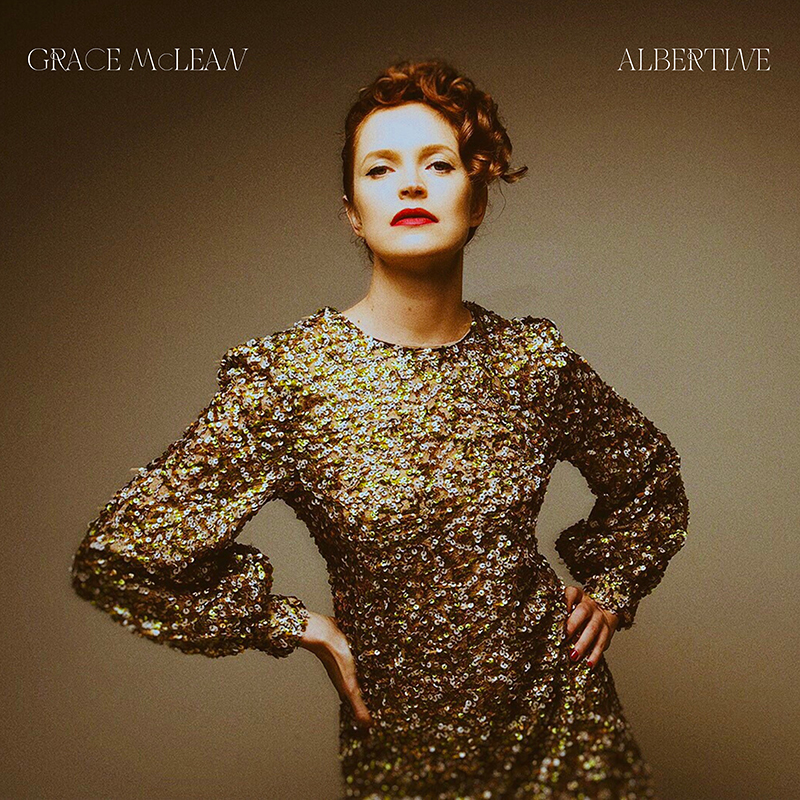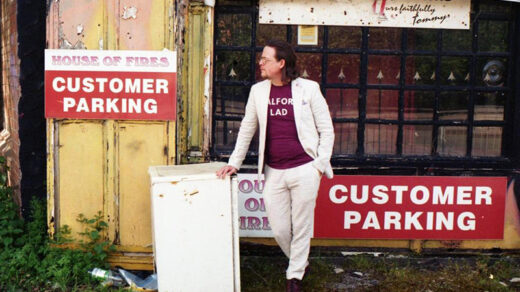Grace McLean’s debut album ‘My Lovely Enemy’ will be released on May 10th
“The slant, the off-kilter, the unexpected…” Emily Dickenson
Ah ha. I think I’ve got it.
I couldn’t think why I was so drawn to the new single “Albertine” by Grace McLean. But there it is. Kate Bush. The unusual effects and sounds used in production, the soaring strings, and the soaring soprano vocals layered one upon another and another. We could be describing the music of Kate Bush, but we are not. We are talking about the unusual, off-kilter, musical world of Grace McLean, a songwriter and artist who creates music that appeals to the dreamer, the people watcher, the thinker, and the connoisseur. Grace McLean delivers a refreshing infusion of artistic liberty in her music, featuring ethereal melodies, rich lyrical depth, pristine vocals, and invigorating orchestral compositions.
Along with artistic sensibility, Grace and Kate have another similarity in their music. Kate Bush drew inspiration from Charlotte Bronte’s novel “Wuthering Heights” for her song of the same name, while Grace found creative influence in the works of the renowned French novelist Marcel Proust for her song “Albertine”.
“I borrowed the name of Proust’s lover in ‘Remembrance of Things Past’ for this song, because of a description he gives of her when they first meet––she appears fractured to Proust, with every changing angle or shift in light she’s different, a new person. She’s slippery and he can’t quite get a handle on who she is,” explains McLean.
Fun fact for those who love a twist to a story. There are no guitars used in the production of her music. Wild. I love the production challenge, and I agree with her producer Justin Goldner who stated “There should be no guitars on a Grace McLean recording“.
Listen to “Albertine” with this Spotify player:
Enjoy our interview with this inspiring artist:
SBN: Congratulations on the release of your new single “Albertine”. How do you feel about sharing these songs with your audience? The songs are crafted so artfully, ignoring the cliches and tropes of commercial pop music.
GML: Thank you! I’m excited to share this new music, I feel like it offers a fuller and richer experience of my work than ever. I’ve gotten to work with incredible collaborators to bring this music to life: my producer Justin Goldner, the mixes by Jack DeBoe and mastering by Blake Morgan. I write following emotional logic more than pop logic and I’m so lucky to work with people who are willing to go on that journey with me and who are excited by that challenge.
SBN: The concept behind “Albertine” is intriguing, drawing inspiration from Proust’s lover in ‘Remembrance of Things Past.’ Can you elaborate on the process of translating this idea into a song, exploring the themes of perception and unreliability?
GML: I wanted to capture the dissonance and discomfort in the feeling of longing to connect with a slippery and unknowable beloved. The lyrics are intentionally opaque, contrasting hyper focused images (a sleeve, a neck, a cigarette) within a poetic landscape (a doorway, sky) and the song musically contains both a close intimate quality and explosive, uncontainable, almost jarring aggression. I want the listener to feel both seduced and unsettled.
SBN: In exploring the theme of an unknowable and unpredictable lover, is there a personal connection with the emotions and experiences depicted in “Albertine”?
GML: I wrote this during the reconstruction era after a breakup and it contains the searching, yearning, and fervent meaning-making I found myself chasing during that time. I remember I felt like a plant who’d outgrown her pot and needed to find a new place to root. I also felt like a “me” who had murdered an “us” and I was grappling with the kind of horror of feeling exuberant while having blood on my hands. And then there’s the way, once a relationship is over, the framing and the light abruptly shift, memories are second-guessed or seen anew or re-contextualized or buried. The way you question your own experience and judgment. Did I really know that person? Did they know me? Who are they to me now?
SBN: We hear that you are currently rehearsing for the role of President Woodrow Wilson in ‘Suffs’ on Broadway. How do you balance your Broadway career with your music endeavors?
GML: I feel incredibly lucky that I get to work on both sides of the table as it were, as both a cog in someone else’s machine and as my own master builder. As an actor I get to be hyper focused on my one track and am able to be malleable and improvisational with my creative impulses without being precious. As a writer I get to use my storytelling skills to zoom out and create entire landscapes that mean something special to me. I love getting to do both because I am able to find multiple avenues in to a creative process while always practicing collaboration.
SBN: Looking ahead, what are your aspirations and goals as an artist, both in terms of your music and your performances on Broadway or in other mediums?
GML: I hope that my creative interests continue to feed each other. I’ve recently done some scoring for theater and film and loved it – I want to continue to exercise that skill. I’m particularly inspired by the work Caroline Shaw has done for the TV show Yellowjackets on Showtime – if TV is ready for that kind of witchy music magic I’m ready to make more of it! In the meantime I’m working on recording new music, writing several new musicals with some excellent collaborators, and I keep my actor muscles strong by continuing to develop new pieces with people I’m constantly learning from.
SBN: What is your songwriting process? Do you compose on piano more traditionally, or take voice memos and self-produce a demo at home before you go to the studio?
GML: Voice memos are definitely my friend! Because I’ve been writing most of my music recently using my looping station, I make many recordings so I can remember which melody line or bass line or harmony or beat goes where or how it sounds when I need to restart the loop. I keep a notebook handy too so I can write down which channel records which sound and when it gets used or muted. Once I’m comfortable with a rough draft I’ll share the piece with my band (bassist Justin Goldner and drummer Hiroyuki Matsuura) and we improvise together.
SBN: We read that you work with producer Justin Goldner. Can you share more about the collaborative process with Goldner in bringing out the nuances of the songs, especially in terms of instrumentation and production choices?
GML: Justin is an incredibly skilled musician and producer and takes my limitations as a musician (I don’t play any instrument well enough to perform with it live, outside of the looping station) as a challenge to look to less traditional pop instrumentation. He’s said many times that he has a rule that there should be no guitars on a Grace McLean recording! I love this – it means we’re thinking more about sonic storytelling and not relying on the first or most obvious choice. We wanted tabla on one song, so we got it. We wanted wild improvisatory whistle tone saxophone on another so we got that. He heard a particular kind of click on one song so we played around with different kitchen utensils until we found the right click. I really believe in telling the truth slant, as Emily Dickinson would say, and Justin has an excellent ear for the slant, the off-kilter, the unexpected.
SBN: With “Albertine”, we love your soft, dreamy vocal performance. Do you feel that artists are releasing music with these softer approaches to vocal production due to the incredible stresses of modern-day life and not wanting to belt and “over-sing” at their listeners?
GML: That’s an interesting observation – I think there’s something about a soft vocal that requires the listener to lean in. A big full-out belting song is about a fire in the singer, maybe from rage or exuberance or deep longing. That softer place is maybe more about an ember, something precious and almost a secret that can only be shared with delicacy. Maybe that’s the kind of connection people are craving right now, something delicate and intimate.
SBN: Your music is very personal and introspective. Are you a loner, and prefer to be solitary? Or do you need nightlife and social interaction to fuel your creative energy? How does your preference influence the emotional depth of your music?
GML: Oh I absolutely need my alone time. I took myself on a silent retreat a few years ago during which I discovered just how much I love solitude! I find it energizing, enriching, and clarifying to slow down and just listen. It’s the listening that allows the music to come through – I don’t like to sit down and force my music into something preconceived, rather I get quiet and listen deeply for what it wants to say. Social interaction is good and fun but it’s draining for me. It’s only afterwards when I have time to reflect on the experience that an expression of the impression from that interaction can come through.
SBN: What is your indulgence? Fashion, Food, Art, or is it something we would never expect?
GML: One of the richest things I’ve been doing for myself lately is reading a poem twice. In the morning, while my coffee or tea is brewing before I’ve jumped into any obligations for the day, I read a poem. Then I read it again while I drink whatever I’ve just made. I find it awakens my mind and my senses and puts me in my body and into a state of alert and grounded awareness. Sometimes I’ll keep a book of poetry in the kitchen so I’m reminded to do it even when I think I’m in a rush. I find it to be a decadent necessity.






